GPT Zero vs. Originality.ai: The Pros and Cons of Both
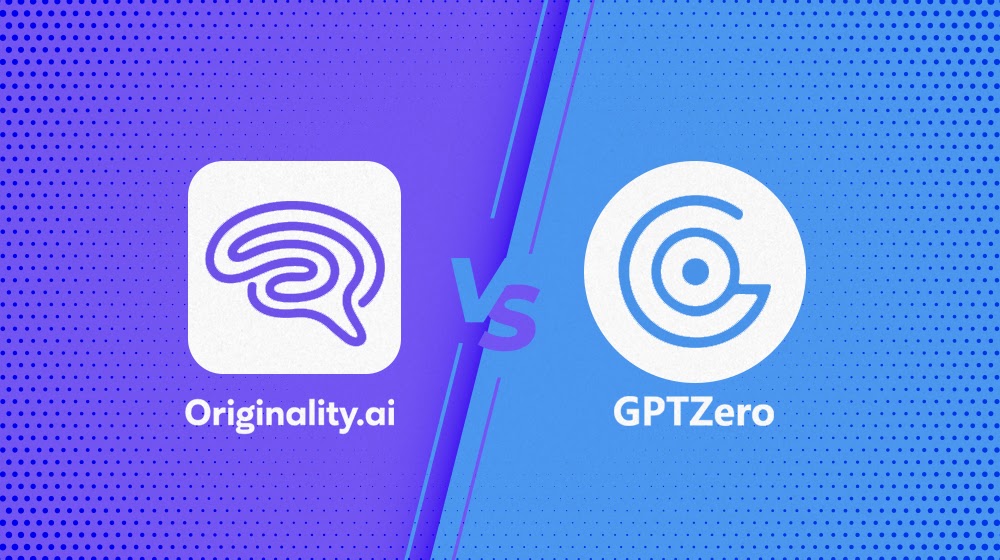
AI seems to be the next big thing in technological development, but the term "AI" is broadly misused. Really, there are four general kinds of AI:
- Machine learning algorithms capable of some self-improvement in performing narrow tasks.
- Generative AI taking things like art, writing, and music, breaking them into statistical models, and applying those models to remix "new" iterations on those forms of media.
- "AI" that is a smokescreen for companies to outsource work in a Mechanical Turk kind of way.
- The concept of a non-human intelligence written about in science fiction.
Of these four, the first one is perfectly fine if narrow in application. The fourth one doesn't exist, and anyone telling you it's even close is either lying to you or on something. The third one is distressingly common, and even the biggest companies try it, like Amazon's cashierless grocery stores supposedly running on AI, which has been revealed to actually be over 1,000 workers in India doing the labor.
Generative AI is the one currently causing the most disruption to various industries. Everything from the latest Red Lobster jingle being written entirely by AI, to AI "web search" replacements (that barely work, at best), to the immense pile of AI-generated writing hitting blogs the world over, it's very much disrupting industries like content creation and blogging, that's for sure.
 30 Second Summary
30 Second Summary
You'll find four main types of AI in today's tech world: machine learning that improves at specific tasks, generative AI that remixes content, fake AI that's actually outsourced human work and sci-fi concepts that don't exist yet. Generative AI causes the most industry disruption, especially in content creation. You need to watch out for AI-written content because it can make up false information and doesn't truly represent your brand's expertise. If you want to check for AI writing, you can use tools like GPTZero or Originality.AI - they're both good, but Originality.AI is stricter and more accurate.
A Brief Overview of the Problems with Generative AI
I'm not going to dig deep into the ethics, morality, or technical issues with generative AI right now. That's certainly a discussion I'm willing to have, but it's not the point of today's post. But, in order to get to the point, you need some idea of why it's important.
A common defense of generative AI that I see is this: "If it looks good enough and has the right information, why does it matter that a program wrote it?"
In other words, if the content passes a cursory inspection, does it matter whether or not a person wrote it or a GPT algorithm wrote it?

I say yes. There are two main reasons for this.
The first is that AI can create very accurate-looking content that is still completely wrong. It can make up words, it can fail to answer questions with specific answers, and it can "hallucinate" things that don't exist. It's fine for no-detail fluff, but anything that requires actual data or specific reasoning, it absolutely can't do. This is because the AI exists solely to produce something that looks human-written, and there's no feedback mechanism in the AI for factual accuracy or logical reasoning. That's why it can get things like basic math wrong and why it's often impossible to get it to do something like "count the number of vowels in this sentence"; because it's not a thinking or reasoning entity, it's your phone's autocomplete dialed up to 11.
The second reason it's important is that, ostensibly, the content you're producing and publishing is meant to be representative of your brand's authority, expertise, and trustworthiness. When you have a robot do that for you, what does that say about your brand? If someone came up to you at a trade show and asked you something about a statement you made in a blog post, you couldn't answer them because you didn't write it.
All of this means you need some way to identify when content is written by GPT or another LLM. You can't just go on vibes – after all, these models were trained specifically to mimic human writing – but there are tells that an algorithm can identify.
When to Use a GPT Detector
GPT detectors are useful in a variety of different situations. As a content marketer, I often work with freelance writers, and I know a lot of other bloggers out there also hire ghostwriters; detecting whether or not they're just throwing GPT output at you to get paid can be a big deal. You can also use it on your competition to see if they're using or abusing AI for their own content and know that you can exploit that weakness in their strategy.
And, of course, there are plenty of other situations where using GPT can be detrimental. A big one is academics; teachers everywhere are confronting the widespread accessibility of an easy tool that students can use to bypass learning, with all that entails.
Teachers having tools they can use to identify academic dishonesty can be very helpful (though always be mindful of false positives.)
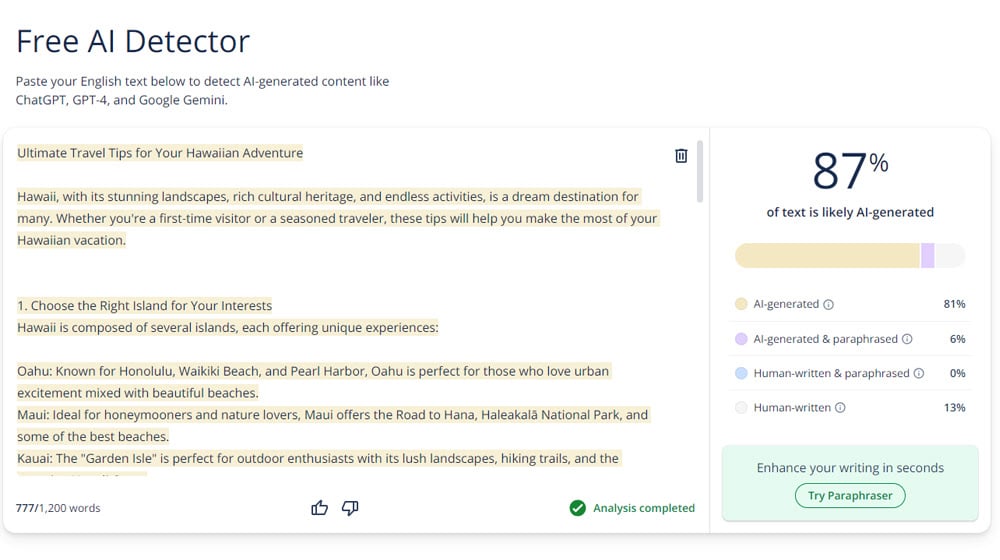
Obviously, this is a problem that hasn't been cleanly solved just yet. We're in the midst of a rapidly evolving technological arms race, where companies like OpenAI and Google are on one end developing better and better ways to make human-like output useful, and meanwhile, efforts like those from GPTZero or Google try to detect AI to flag it and allow human-created content to shine.
Yes, I mentioned Google on both sides here. They really are; on one side, they want to be leading in any technological battle, but on the other hand, the viability of web search – and thus their entire advertising model – depends on search results being useful, which AI often isn't, so they're very much battling against themselves.
Two of the leading AI detectors right now are Originality.AI and GPTZero.
The question is, which one is better? I've used them both and have some opinions, but I'll leave the final choice to you.
All About GPTZero
GPTZero, which you can find here, offers both free and paid services.
The free service is simple and moderately effective, but limited in what it can tell you. You can run up to 5,000 characters worth of text through it, which is equivalent to about 900 or so words of content. For reference, from the start of this post to the "final choice to you" bit above is around 4,400 characters without counting spaces, or 5,300 with; GPTZero does count spaces, so keep that in mind.
The free scan will tell you the probability of the content being AI-generated and how much of it is AI-generated, according to their analysis. They don't tell you how they perform their analysis (it could be defeated more easily if they did), but I've found it to be fairly reliable. They can also tell you an estimate if there are sentences that are mixed – that is, AI-written but with a couple of edits made by humans.
They can be wrong! I've had them flag sentences I've written as AI, and I've seen it take 100% GPT output and place it at 90% or so. Overall, however, it's generally quite good.
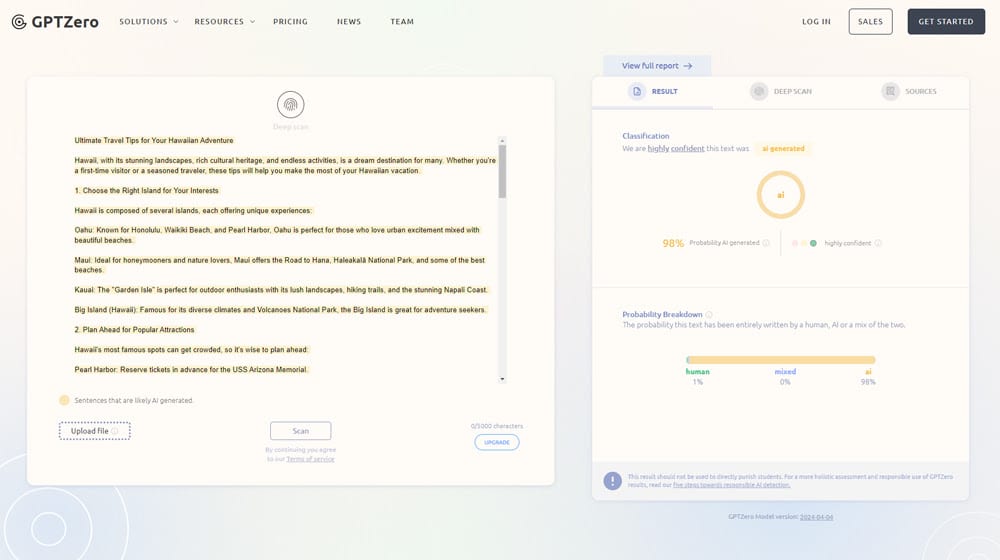
I'm not really here to discuss just the free version, though, because the real value lies in the paid version. The paid version gives you two very useful features: the deep scan and the source finder.
With the free scan, all you get is a holistic overview of the content it scans. They don't flag individual elements; they just give you an overall percentage. The deep scan goes sentence by sentence and tells you which ones specifically are likely AI-generated. It can even tell you which AI system was used to generate the content and flag different models, including your usual GPT and things like Jasper, Falcon, Bart, and Claude.
The source finder is a plagiarism detector similar to something like Copyscape, which can find if the AI is pulling directly from sources, and lets the tool do double duty as an AI usage and direct plagiarism detector. Most of the time people won't be mashing up AI and stolen content in the same post, but if they are (say, to avoid GPT detectors) then it can flag it for you.
Pricing is pretty reasonable as well. Paid plans start at $10 per month, though the deep scan requires at least the $16 per month plan. Even their top-tier enterprise plan is only $23 per month. The biggest differences in features between them are mostly the number of words you can scan a month (150k for the cheap plan, 300k for the middle plan, and 500k for the top plan with the option to top up credits if you need more).
I'll go a bit deeper into my thoughts in the comparison section in a bit.
All About Originality.AI
Originality, found here, is another of the leading competitors for the best AI detection tool on the market today. Where GPTZero is aimed at anyone who might need to use it, with some emphasis on teachers and educational institutions, Originality is more aimed directly at website owners, content companies, marketing agencies, and web publishers. You can bet they're aiming for contracts with freelance hubs like Fiverr or Upwork or big publishers with thousands of writers like Forbes.
One interesting thing is that Originality also has some features for writers to use to prove that they made the content and that any positive hits are false positives. This is done in a few different ways, including a fairly intrusive session monitoring feature that allows a writer to record their session of content creation to provide to their clients. I don't think that's very useful (someone could just use GPT on another window/browser/device and manually retype the content), but the effort is interesting.
Overall, the AI detecting features work pretty well. They have a very low rate of false positives and a high rate of detection in their 2.0 Model, and they have a plagiarism detector that also detects "paraphrase plagiarism", which is where an AI is asked to summarize a piece.
They also have a fact checker assistant, which can identify statements made in a piece and try to see if there's a risk of them being false or hallucinations. I haven't gotten much use out of that feature, but it's also a good initiative to have.
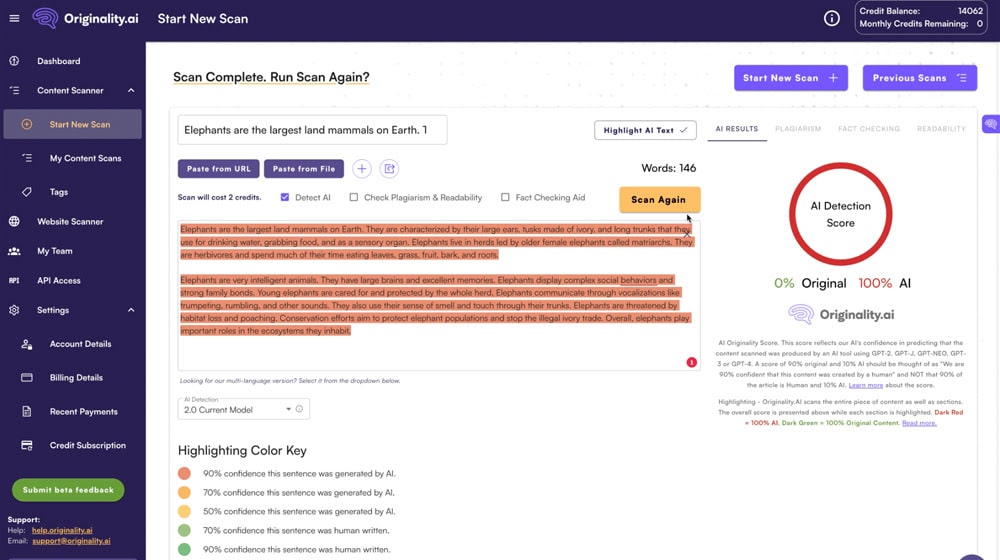
The biggest downside to Originality is the lack of a free plan or tool to use to try it out, at least without jumping through hoops. You can use their Chrome extension to try it out with 50 credits, but that's not very much, and it's less convenient than GPTZero's simple free scan on their homepage.
They have a one-time pay-as-you-go plan that costs $30 to get access and gives you credits that are used at a rate of 1 credit for 100 words of AI scanning or 1 credit for 10 words of fact-checking. Or, they give you subscription plans starting at $15 per month for 2,000 credits.
Credits do unfortunately expire each month, so make sure you're only getting the credits you need and using them when you get them, so you don't waste money.
Their 3.0 model is currently unusable. They made it the active model for a bit, then quietly stuffed it in the background so it's less visible, but clearly it still has a lot of bugs they are trying to iron out. It basically labels everything as AI, human and AI content alike. Every post on every site will show as AI. So, that's not very helpful - yet.
Which is Better: GPTZero or Originality.AI?
This is an interesting comparison.
I actively use both, and I think that's the way to go, because they can both catch things the other misses, and they definitely look at different aspects of text.
For example, Originality pays a lot of attention to commas. Since Grammarly (which is now AI-driven itself) loves to insert commas into everything, a completely human-written piece with Grammarly suggestions can trigger Originality's red flags. It also flags some specific words that AI tends to use more often than humans do.
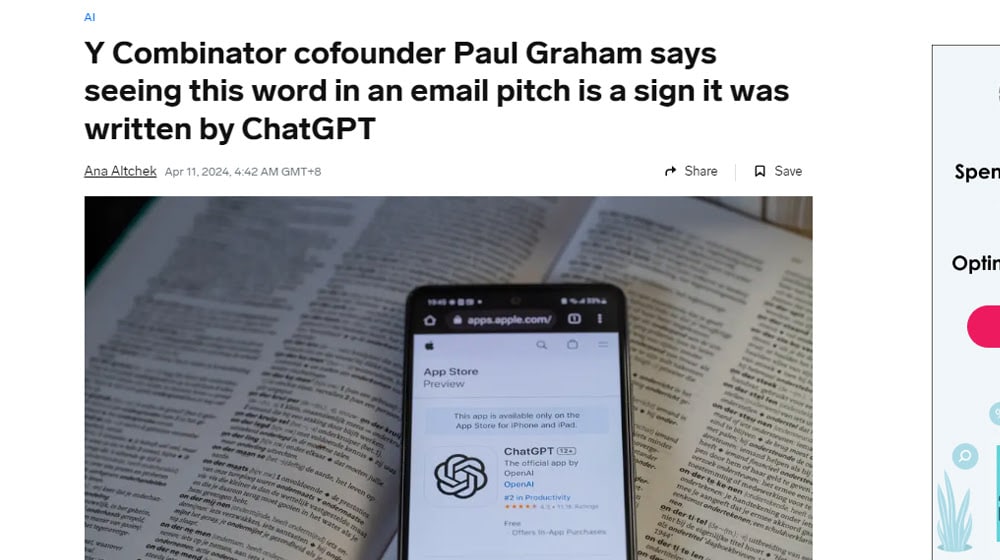
Originality is very strict and very sensitive. This is a good thing when you want to eliminate all possible false positives, but dealing with them can be a huge pain, especially if you're used to a workflow using Grammarly. It's also very expensive for what it does, so be picky with it.
GPTZero is also very accurate, though not quite as accurate or as strict as Originality. I love the deep scan and being able to go line by line through content to see what it is flagging. It's a little more prone to false readings, but it's still leagues better than a lot of the other detectors out there, and the pricing is a lot nicer.
If you had to pick one tool, I'd recommend Originality. If you have room to use more than one and compare the results, use them both. It's what I do, and I find it gives you the best read on a piece of content.
What do you think about these tools? Which do you like most? Is there a tool you like better? Leave me a comment below and let's chat about it!



 30 Second Summary
30 Second Summary



Comments